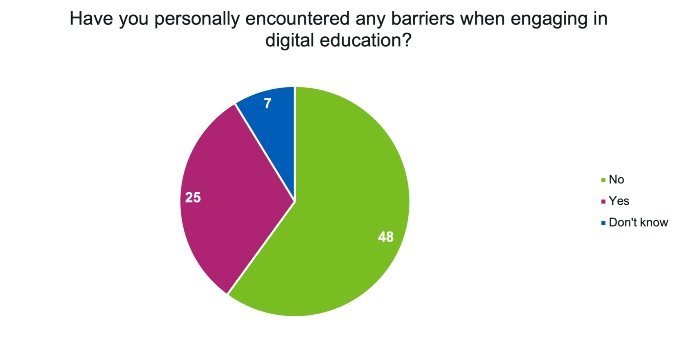Barriers to developing digital literacy
Key findings: The digital literacy, digital technologies skills and techniques currently being taughtFind out about barriers to digital literacy.
Most students indicated that they have not encountered any barriers when engaging in digital education (Figure 21).

However, in the survey, several barriers were identified to engaging with digital technologies from all groups, including students.
Quote
Quote
Some students find it challenging to engage with online education which will limit the degree of digital literacy they can achieve. This can be due to physical implications such as eye strain, which can result in headaches/migraines for some students, or social isolation. One student also talked about the pressure they feel when they have to unmute themselves to speak during a meeting, because it draws attention to the person speaking and they felt that what they said had to be worth unmuting themselves for. The etiquette around online meetings and lectures appears to be challenging for some students.
Additionally, for students who are neurodivergent and have conditions like ADHD (Attention Deficit Hyperactivity Disorder), they reported finding it more difficult to concentrate in an online learning environment. This means that these technologies are not always accessible for people with additional needs.
During the focus groups, participants also identified a lack of training and lack of time as significant barriers to developing digital literacy.
Quote
If students do not have the time to engage with specific technologies on placement, they cannot develop the digital skills required for their profession
Additionally, one participant in the focus group highlighted that the curriculum is only updated every 5 years.
Quote
At the rate digital technologies are being changed and developed, the curriculum is quickly becoming outdated which makes it challenging to develop appropriate digital skills.
Quote
Another barrier is resistance to change.
Quote
Fear of new technologies or technophobia can result in a lack of confidence which may hinder progress. It may be particularly challenging to embed digital technologies into the curriculum if staff and students are unwilling to engage.
Of those currently able to introduce digital technologies to support learning, the skills of faculty are mixed.
Page last reviewed: 10 May 2023
Next review due: 10 May 2024